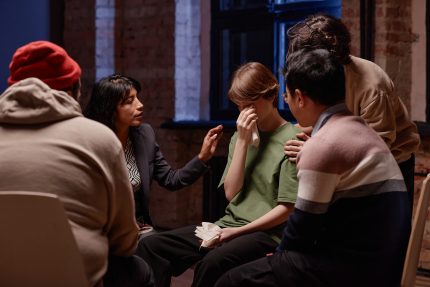Have you ever found motivation or clarity just by talking to someone who “gets it”? That’s the power of a peer support network, a community built on shared experience, mutual understanding, and encouragement. Whether you’re navigating mental health challenges, career burnout, or addiction recovery, surrounding yourself with the right people can be transformative.
At Lifeline Behavioral Health, we understand how vital human connection is to healing and why peer networks matter more than ever, especially for those in high-stress or creative professions.
What Is a Peer Support Network?
A peer support network is a group of individuals who share common life experiences, professions, or challenges and come together to offer one another encouragement, accountability, and guidance. These networks aren’t just social. They’re deeply therapeutic.
Unlike clinical treatment settings where guidance comes from professionals, peer support networks thrive on shared lived experience. These relationships help reduce isolation, improve emotional resilience, and provide a sense of belonging.
How Peer Support Promotes Recovery
If you’re healing from trauma, mental health disorders, or substance use, peer support plays a key role in recovery.

When stress is high and support is low, the risk of relapse increases. But when you’re surrounded by others who have walked a similar path, you’re more likely to stay grounded and hopeful. A peer support network can offer:
- A nonjudgmental space to share struggles and wins
- Insight and suggestions from those with firsthand experience
- Emotional validation from people who truly understand
For people in recovery, these networks can fill the gaps that family or friends may not be equipped to handle, especially if those loved ones don’t understand the pressures of your industry or the weight of your recovery journey.
High-Stress Careers That Benefit from Peer Support
While all professions carry some level of stress, some fields are more consistently overwhelming. According to data compiled by O*NET and the U.S. Department of Labor, careers in healthcare, emergency services, law, and education rank among the most stressful. But what’s often overlooked are high-stress creative fields, such as musicians, writers, performers, and designers, who frequently work in isolation or under unstable income and deadline pressure.
For those in creative industries, a peer support network can provide not just emotional relief but also collaboration, inspiration, and accountability.
Building a Peer Support Network in the Arts
Creative professionals often face an added challenge: isolation. Whether you’re a painter working solo in your studio or a touring musician between cities, finding community can feel impossible. But building a peer support network tailored to your industry and lifestyle is possible.
Here are some ways to start:
- Social media & online forums: Look for artist collectives, sober creatives groups, or mental health support spaces.
- Local resources: Libraries, community centers, and coffee shops often host or post about meetups.
- Sober spaces: While many creative events center around alcohol, there are increasingly more substance-free options, open mic nights, gallery shows, or pop-up markets.
How to Start Your Own Peer Support Network
If you can’t find the right group, create one. Here’s how to build a strong foundation:
1. Set Shared Goals
Agree on what the group wants to accomplish. These goals might include:
- Meeting monthly for check-ins
- Supporting each other at performances or shows
- Offering space for creative collaboration
- Venting without judgment
- Celebrating progress in sobriety or mental health
2. Choose a Format That Works
Decide how you’ll meet and communicate:
- In-person at a central location (library, café, or community room)
- Online through Zoom, Discord, or a private Facebook group
- Hybrid, with rotating formats based on members’ needs
3. Promote and Invite
Use social media, flyers, or word-of-mouth to invite others. Be clear about your group’s purpose, whether it’s for sober creatives, trauma recovery, or peer-to-peer mentorship.
Why Lifeline Believes in Peer Support
At Lifeline Behavioral Health, we know that recovery is not just about therapy or medication. It’s about connection. That’s why our programs emphasize group support, peer mentorship, and creative expression, especially through our Recovery Center for the Arts.
We offer spaces for people to create, connect, and heal, whether that’s in a music studio, an art room, or a circle of peers sharing their stories. Our approach blends clinical excellence with human understanding, helping you build the internal and external support you need for long-term change.
Ready to Build Your Peer Support Network?
If you’re feeling isolated, overwhelmed, or unsure where to start, you’re not alone, and you don’t have to do this alone. Whether you’re a working artist, a healthcare provider, or just someone seeking a sense of community, a peer support network could be the key to your next breakthrough.
Contact Lifeline Behavioral Health today to learn how our programs can help you find support, connection, and healing through community.


